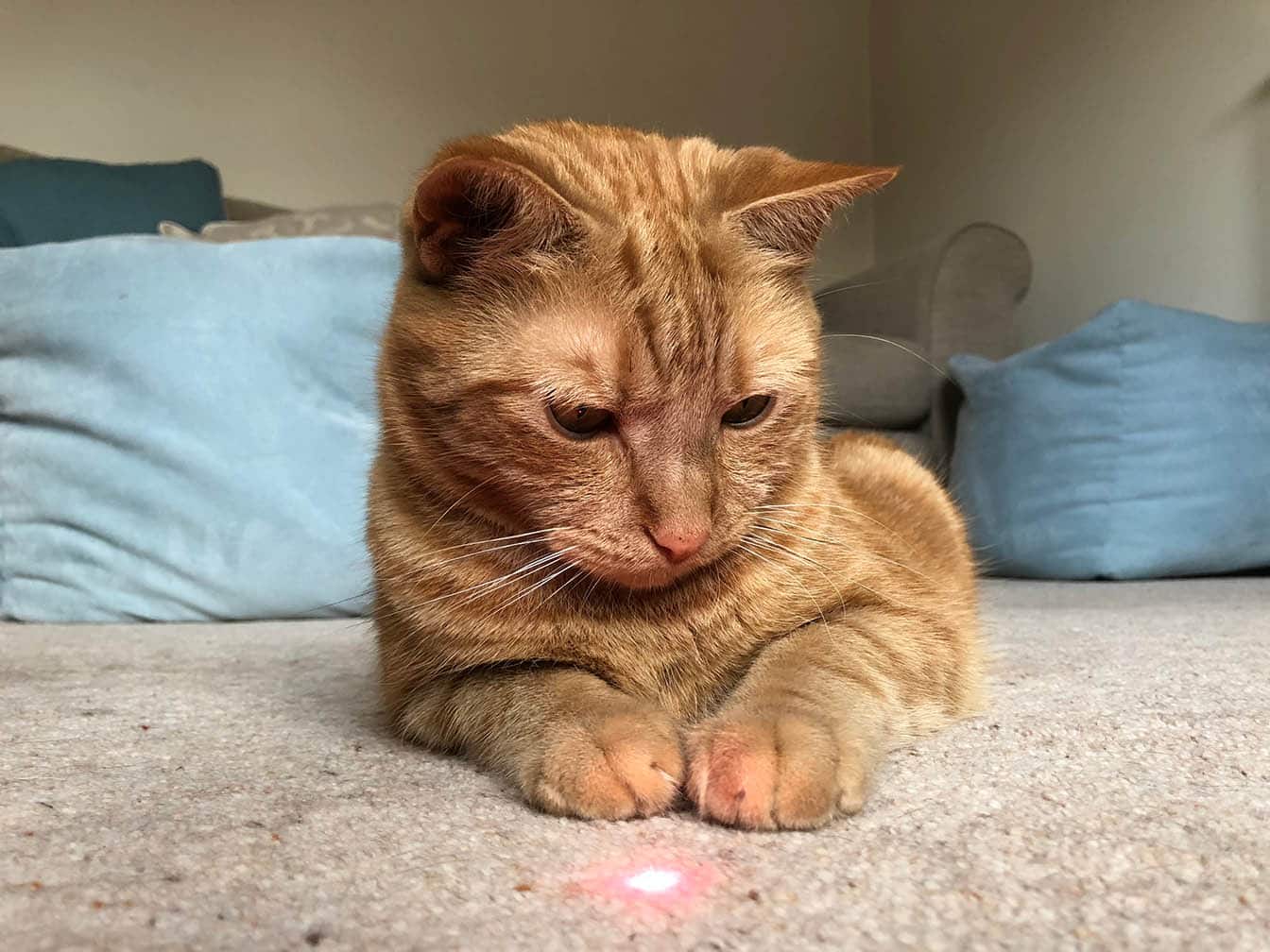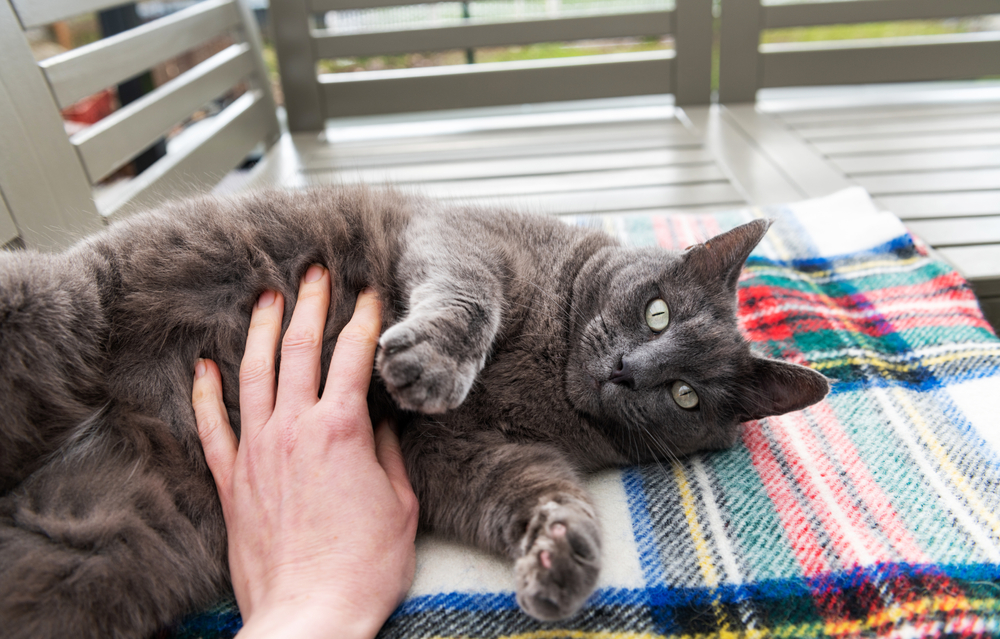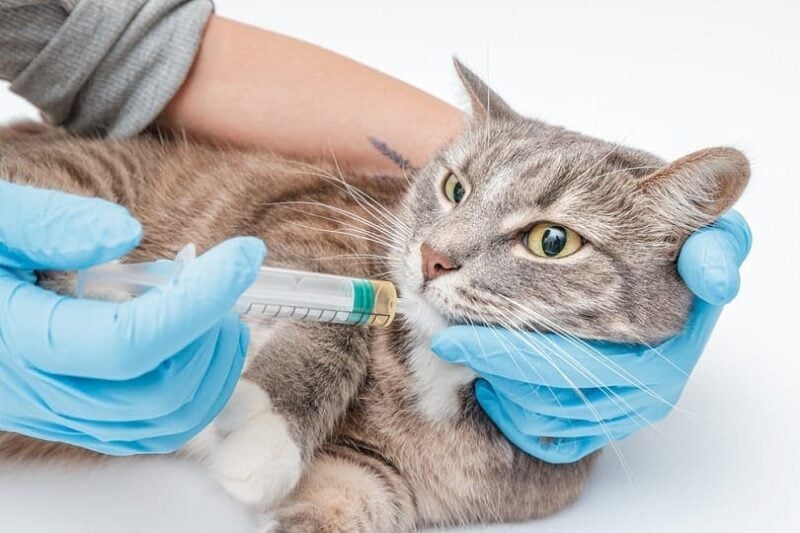In this article
It’s challenging to be hard of hearing, whether you walk on two legs or four. If you have a furry friend born without hearing or your senior kitty is beginning to struggle, you’ll need to help them adapt to your home and lifestyle. Luckily, cats have excellent senses of touch, sight, and smell. They can often use their other senses to get around hearing loss so well that you might not realize it at first.
However, there are a few tips and tricks that can help your cat be safe and loved.

The 7 Tips for Taking Care of a Deaf Cat
1. Keep Regular Routines

One of the hardest parts of deafness in cats is that it can be hard to communicate with your cat when they’re not around. If your cat is deaf, regular routines are a must. This is especially important around mealtimes. Feeding your cat at the same time each day will help them to know when to show up for food, even if they can’t hear you filling their bowl or calling them.
2. Explore High Pitches

Not all deafness occurs equally. Cats have a different hearing range than humans, and some cats may only lose hearing at specific parts of their range. It is common for cats to be unable to hear the lower-pitched sounds of human footsteps and voices but still retain some hearing. Consider trying a dog whistle or similar high-pitched tone to get your cat’s attention.
3. Consider a Collar Locator

An electronic locator can also be a lifesaver if you have deaf cats. Although there aren’t many cat-specific locators on the market, products marketed as key finders or trackers can often be clipped to your cat’s collar. These usually connect to your phone so that you can trigger the locator to make a noise or even see the location of your cat on a map. This is important with deaf cats because you can’t call them to find them. If your cat ever gets outdoors or accidentally escapes, it’s even more important to be able to find them quickly.
4. Signal With Lights and Lasers

You can sometimes wave or beckon if you need to get your cat’s attention from a distance. But if your cat isn’t looking at you, it gets tricky. Many pet owners use a bright flashing light to signal to their cats and get their attention. Lasers are another option; simply shine the laser in your cat’s line of sight and then move the dot so that they turn around. However, it’s important to be careful with lasers—a powerful light reflecting into your cat’s eye could cause damage, plus it can lead to frustration if they try to catch the laser and never succeed.
5. Respond Quickly to Meows

Deaf cats aren’t always silent cats. They might meow just like normal, and sometimes they’ll meow louder to compensate. However, deaf cats might quickly grow frustrated because they can’t hear you coming, and they don’t know how loud they’re meowing. Because of that, it’ll help your cat if you’re extra prompt when responding to meows. That way, they’ll know you can hear them if they can’t hear themselves.
6. Keep Up With Quality Time

Cats tend to be seen as loners, but they appreciate company too. Many cats take a lot of comfort from the sounds of household activities throughout the day, putting deaf cats at a higher risk for loneliness. It’s important to spend some quality time with your cat every day. Make some time for active interaction—playing, petting, and cuddling—but also for just “hanging out.” Just spending time in your cat’s line of sight can help them feel safe and connected.
7. Monitor Outdoor Activities

Although most cats can get around by sight at home, outdoors is another matter. Without hearing, cats are at risk from predators, other pets, passing cars, and other dangers. Because of that, we recommend keeping your deaf cat indoors or creating an outdoor safe and enclosed area, such as a catio, where your cat can play safely. Depending on your cat’s previous habits and routines, you could consider leash-training your cat or letting them have 100% supervised and controlled outdoor time.

How to Tell if Your Cat Is Deaf
It can be tricky to tell if your cat is deaf, especially if it comes on gradually or if they are partially or unilaterally deaf. It is important to speak to your vet whenever you detect hearing loss in your cat or if you suspect your kitten was born deaf. If necessary, some vets perform a BAER (brainstem auditory evoked response) test on cats to assess deafness. This test is not widely available, though.
You can also consult a vet online if you need quick and easy access to an expert’s opinion.
If you need to speak with a vet but can't get to one, head over to PangoVet. It's an online service where you can talk to a vet online and get the advice you need for your pet — all at an affordable price!
At home, there are a few cues that can make you suspect deafness. Deaf cats might appear more visually attentive to humans and often sleep through loud noises, startle easily, and meow more loudly than hearing cats. However, they can often use visual cues and even vibrations from voices and footsteps to “fake” hearing. A good way to test if your cat is deaf is to play a loud noise from somewhere behind your cat. If your cat is awake and has healthy hearing, their ears should swivel backward to take in the noise, even if your cat doesn’t otherwise react. If your cat constantly misses these cues, it likely is a sign of hearing loss.
Causes of Deafness in Cats
There are many causes of deafness in cats. The most common form of deafness occurs from birth because of genetic reasons, and it is associated with the white pigmentation gene (W) seen in cats with white coats and blue eyes.
Nerve damage, infection, use of ototoxic products, and inflammation can cause temporary or permanent hearing loss. Hearing can also degrade as your cat ages; however, this does not appear to be a common occurrence in cats. This type of deafness is technically called presbycusis. Most of the time, being deaf isn’t a sign of any other diseases or threats to your cat’s health other than a heightened risk of injury due to not hearing a danger.

Conclusion
Deafness is not easy, but it’s also not as scary as it seems. Even though your cat might struggle with some things, most cats can adapt quite well to deafness. A few simple changes to your habits and home will make it way easier for your cat to stay happy, healthy, and safe.
Featured Image Credit: U__Photo, Shutterstock























2 Responses
My Maine coon more than 'mature' male (some 12 years old ) has had his coat trimmed recently, and was sedated for the treatment. He came beck to me, very wobbly, semi conscious, loss of balance and unable to move for more than 24 hours post fur trimming.
Now, it is 5 days since, and he is profoundly deaf. He has more than regained his appetite, but YOWLS loudly when wanting attention. he is slowly regaining strength, but very VERY unsteady. Will this condition be permanent ?
I believe that this might have been caused by when a nurse cleaned his ears out, the washing of the ear opening might have been compromised by whatever was used. I didn't request this treatment, just a de-tatting' of his coat, so I am very distressed by this event!
Hi Blue Peter, sorry to hear about your Maine Coon. If you think the eardrum was perforated, please get him checked by a vet. We recommend asking the groomers what sedatives and ear cleaning products they have used.